Stretching promotes relaxation and stress relief. It can help calm the mind, improve focus, and reduce mental tension, making it a beneficial practice for both physical and mental well-being.
Use these five stretches to relax the body and help reduce stress.
CHILD'S POSE
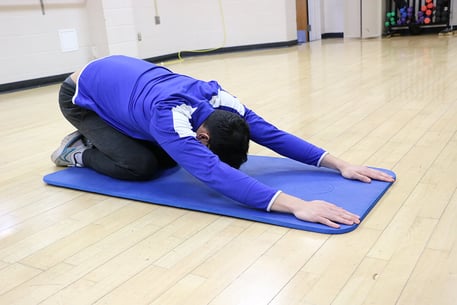
Your lower back is a prime place for the body to hold tension. Stretches like this one, which elongates the back, release low back tightness and stiffness. This stretch can also promote healthy sleep, according to Harvard Health Publishing.
How to Do It: Kneel on the floor. Bring your feet together and open your knees to create a V shape. Sit back, keeping your butt on or reaching toward your heels, and walk your hands in front of you so that your chest lowers to the ground. Breathe deeply through your diaphragm. Add cushioning (such as a pillow) under your lower body if you’re having discomfort with kneeling. You can also limit how far you move your head and chest toward the floor to make the pose easier.
HAPPY BABY
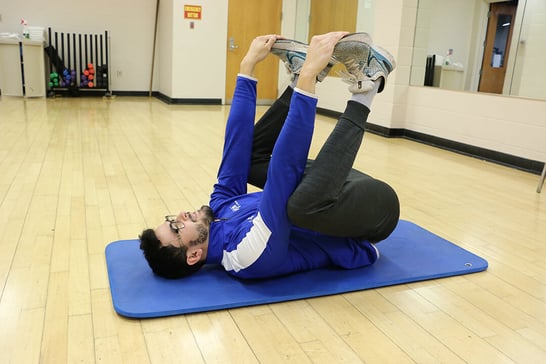
The benefit of this stretch is that it will help open your hips, which is a common reason for a tight back. It also helps relieve back tightness by loosening up your lower lumbar spine.
How to Do It: Lying on your back, lift your knees toward your chest. Grab the bottoms of each foot with your hands and pull your knees toward your chest and armpits. If you can’t reach your feet, grab your lower legs.
ROTATIONAL NECK STRETCH
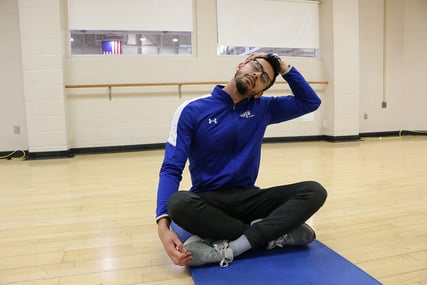
Reacting to stress by tensing up your neck and scalp muscles can trigger a tension headache. To keep healthy flexion in your neck and let go of tightness, this simple and effective neck stretch targets the muscles in the back of your neck.
How to Do It: Bring your chin to your chest and rotate it toward an armpit. If you need more stretch, try placing your hand on the back of your head and pushing your head closer to your armpit. Repeat, rotating your chin to the other armpit. Be mindful not to elevate your shoulders, keeping them relaxed throughout the stretch.
WIDE-LEGGED FORWARD FOLD WITH CHEST EXPANSION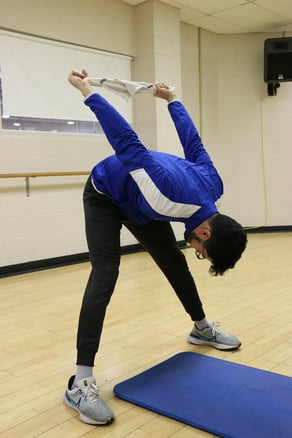
This stretch targets your upper and lower body, making it a perfect do-it-all move. It’s especially great for tight hamstrings (common in walkers and runners), as well as tight chest and shoulder muscles (common if you often sit at a desk typing).
How to Do It: Stand with your feet 3 to 4 feet apart. Softly bend your knees. Hold one end of a small towel in one hand with your palm facing behind you, then reach your opposite hand back to grab the other end of the towel. Inhale and roll your shoulders back and down. Exhale and slowly fold forward (focus on hinging at your hips). Move your arms forward to draw your knuckles toward the ceiling (and downward toward the floor if you can). For more stability, keep your hands at your hips as you bend forward.
CHEST OPENER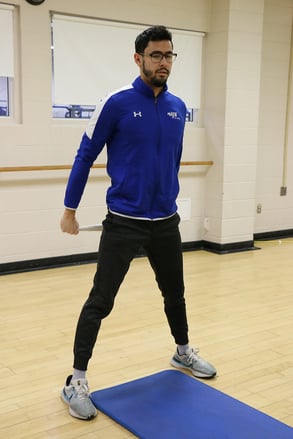
This is a great at-your-desk stretch when you need a quick release. This stretch promotes proper posture and releases tension through your chest to maximize oxygen and circulation.
How to Do It: Clasp your hands behind your back, squeeze your upper shoulder blades toward each other behind you, and push out through your chest. Keep your core straight and avoid overextending your back
Interested in an individual stretching session? Contact Chris to schedule a session.
This blog was written by Chris McDonald, NIFS Health Fitness Specialist. To learn more about the NIFS bloggers, click here.

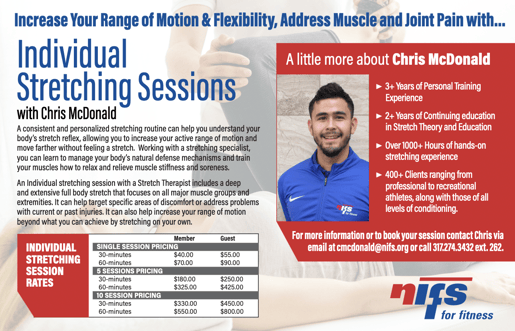
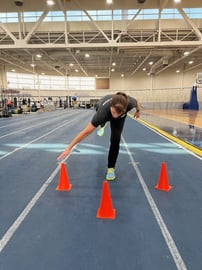
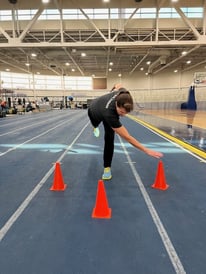
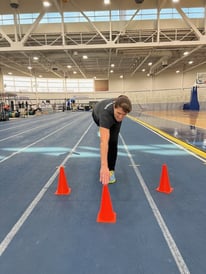
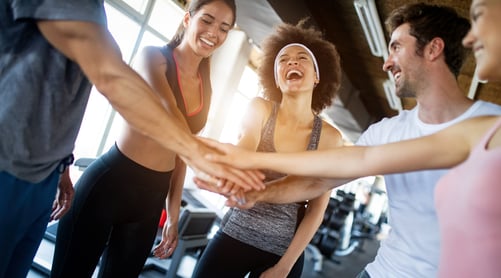
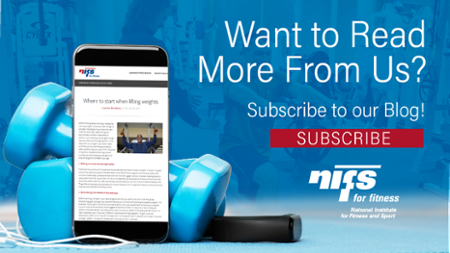
.jpg?width=480&height=309&name=GettyImages-1448979924(2).jpg) In today's fast-paced world, where new diet trends and health fads emerge almost daily, it can be challenging to discern what truly benefits our bodies. Amid this whirlwind of ever-changing advice, the key to a healthier life may not lie in exotic superfoods or rigorous diet regimens, but in the consistent practice of nutritional basics.
In today's fast-paced world, where new diet trends and health fads emerge almost daily, it can be challenging to discern what truly benefits our bodies. Amid this whirlwind of ever-changing advice, the key to a healthier life may not lie in exotic superfoods or rigorous diet regimens, but in the consistent practice of nutritional basics.
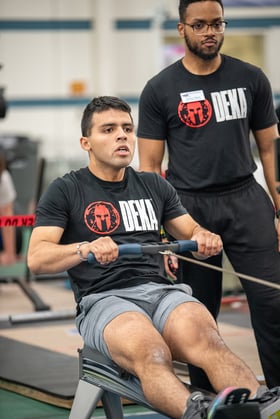
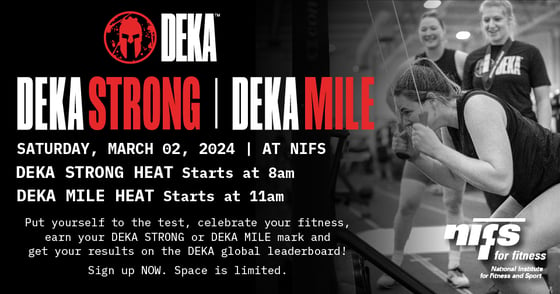
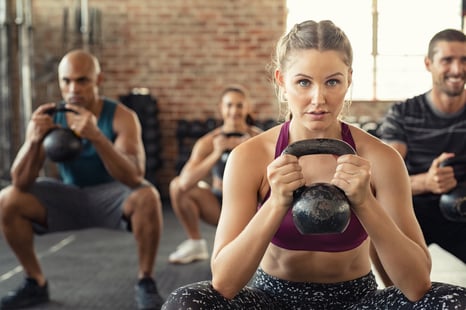 Functional training is an excellent approach for longevity and maintaining a healthy lifestyle and functioning body because it emphasizes movements that mimic activities of daily living, enhance flexibility, and improve overall mobility. In this blog, you will learn about the different functional exercises that can contribute to your longevity, along with their benefits and daily function.
Functional training is an excellent approach for longevity and maintaining a healthy lifestyle and functioning body because it emphasizes movements that mimic activities of daily living, enhance flexibility, and improve overall mobility. In this blog, you will learn about the different functional exercises that can contribute to your longevity, along with their benefits and daily function. 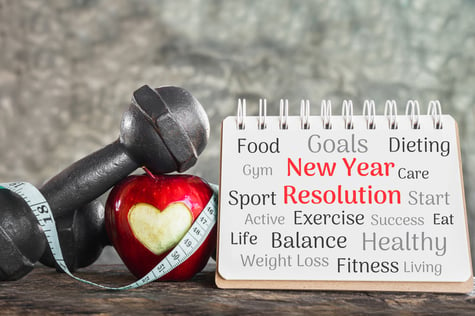 Happy New Year! As we embark on a journey to transform our lives through physical fitness, mental well-being, and a balanced lifestyle by exploring the components of a holistic approach to health that will help you achieve your fitness goals and lead a fulfilling life.
Happy New Year! As we embark on a journey to transform our lives through physical fitness, mental well-being, and a balanced lifestyle by exploring the components of a holistic approach to health that will help you achieve your fitness goals and lead a fulfilling life. Roughly how many hours of sleep would you say that you average per night? Six hours? Ten hours? Now think about your fitness goals and the results you want to see from exercising. Are you where you would like to be, or are you on pace to get to where you would like to be? You can be doing everything correctly from the exercises that you perform, nutrition and supplementation, stress reduction, whatever it may be, and you aren’t quite getting the results you’re looking for.
Roughly how many hours of sleep would you say that you average per night? Six hours? Ten hours? Now think about your fitness goals and the results you want to see from exercising. Are you where you would like to be, or are you on pace to get to where you would like to be? You can be doing everything correctly from the exercises that you perform, nutrition and supplementation, stress reduction, whatever it may be, and you aren’t quite getting the results you’re looking for. 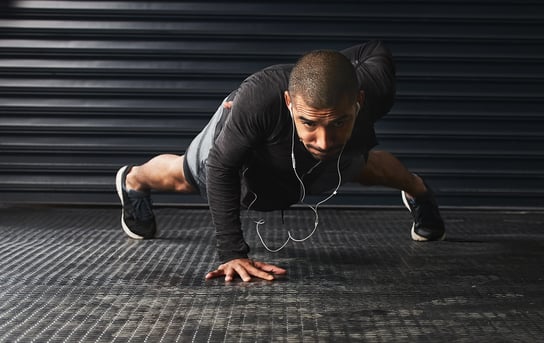 If you’re like me and absolutely love listening to music and discovering new artists, genres, etc., then I could bet that you most likely listen to music while you exercise. Combining music and workouts has become a common practice among fitness enthusiasts because it can provide a boost of motivation and energy for when you’re testing your one-rep max or just taking a brisk walk outdoors. However, in this blog I will discuss the potential drawbacks of listening to music during a workout/training session and, hopefully, it will make you think about how music (or no music) plays a role in your training.
If you’re like me and absolutely love listening to music and discovering new artists, genres, etc., then I could bet that you most likely listen to music while you exercise. Combining music and workouts has become a common practice among fitness enthusiasts because it can provide a boost of motivation and energy for when you’re testing your one-rep max or just taking a brisk walk outdoors. However, in this blog I will discuss the potential drawbacks of listening to music during a workout/training session and, hopefully, it will make you think about how music (or no music) plays a role in your training..jpg?width=537&height=358&name=GettyImages-1187356524(1).jpg) In an athlete’s world, every fraction of a second and inch of athletic performance are significant for them to play at their best on and off the field. However, being an athlete means consistently searching for innovative ways to elevate your game. This is where fascia training enters the conversation as one of the many ways of improving one’s athletic performance. Fascia training is an emerging topic that holds the promise of unlocking your untapped potential and improving your performance.
In an athlete’s world, every fraction of a second and inch of athletic performance are significant for them to play at their best on and off the field. However, being an athlete means consistently searching for innovative ways to elevate your game. This is where fascia training enters the conversation as one of the many ways of improving one’s athletic performance. Fascia training is an emerging topic that holds the promise of unlocking your untapped potential and improving your performance.